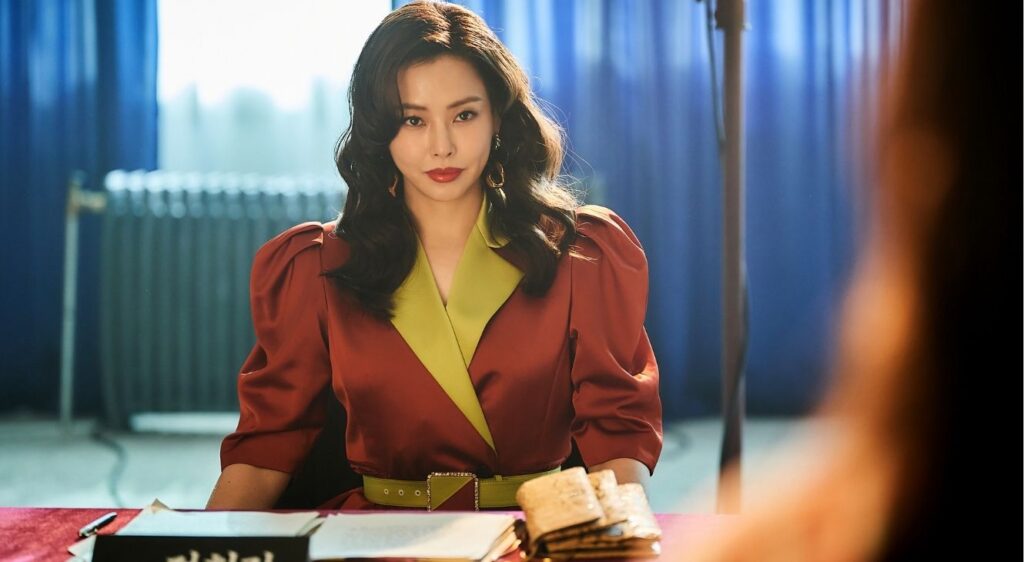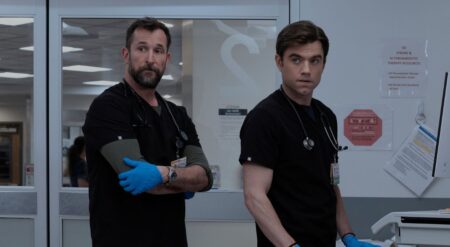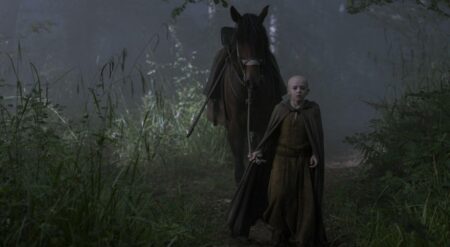The latest Kdrama Netflix series, Aema, blends history revisionism with comedic undertones that help keep the otherwise darker subject matter the series explores from taking over. Set in the 1980s, the series is loosely based on the production of South Korea’s first erotic film after censorship restrictions were loosened. Already a hot mine for things to explore, Aema pulls zero punches with its production value, no-holds-barred approach to the industry and its many problems. Yet, at its core lies a story of perseverance and ambition against all odds.
At the start of the series, Jung Hee-ran (Lee Ha-nee) is at the top of her game. She is an actress who has captured the hearts of many, with multiple acting awards, commercial deals, and an attitude to match. After swearing off going nude in films moving forward, Hee-ran and Gu Joog-ho (Jin Sun-kyu), the owner of the production company, butt heads. Not helping Hee-ran is a sticky legal contract that allows Joog-ho full control of Hee-ran’s career, forcing her into difficult positions to keep not only her career, but also the company going.
Her refusal to go nude prompts Joog-ho to replace her as the lead in the upcoming production of Madame Aema. Caught between these two is the incredibly awkward rookie director, Kwak In-woo (Cho Hyun-chul), who wants to see his first film come to life. A chance audition in an alleyway that arguably may be the most cinematic (though clichéd) moment of the series, thrusts newcomer Shin Joo-ae (Bang Hyo-rin) into the lead role. The longer she works on the film, the more her illusions of the industry are broken down. Is this career worth it?
Only the strong survive, and no one can deny that Hee-ran and Joo-ae have strength in spades.
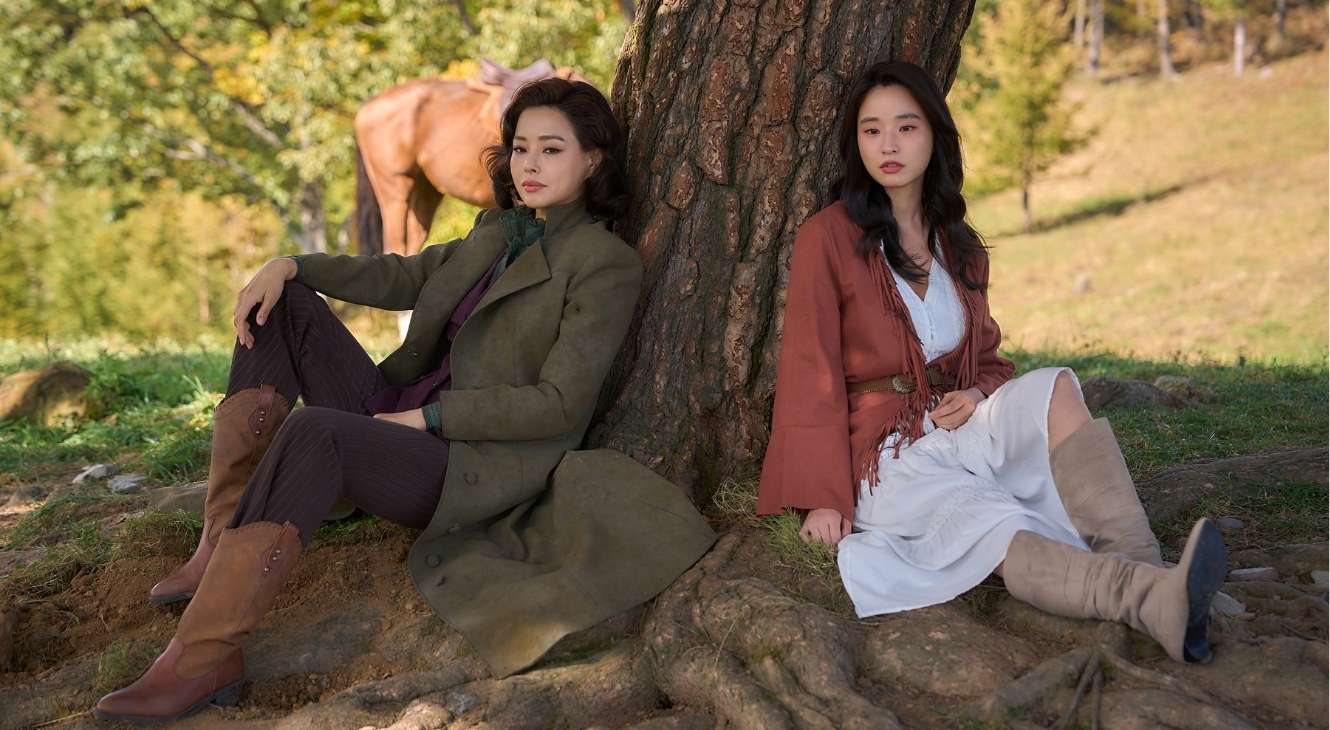
This is not a simple retelling about the making of Madame Aema, the film that rocked South Korea upon its release. Directed by Lee Hae-young, the series takes full advantage of the complexities of this period in South Korean history, exploring the underbelly of the film industry and the intimate control and influence the government had over it at the time of release. The subject matter alone instantly makes this a titillating viewing experience. Yet, this is not all.
The story features layers that give more for both the performers and viewers to chew on. A byproduct of the industry itself, misogyny is rampant. Both Jung Hee-ran and Shin Joo-ae are at the center of many derogatory and crude statements, and find ways to adapt, evolve, and maneuver around the men in the periphery. It’s easy enough for them to lash out at each other, fighting for scraps in a dog-eat-dog world for women. And, for a brief time, they do.
However, as the story develops deeper, and Joo-ae is forced into more uncomfortable situations, she realizes that Hee-ran’s harshness isn’t something to be taken at face value. At one point, Hee-ran tells Joo-ae, “Bitches survive.” In an industry that chews people up and spits them out, the only way women like Hee-ran survive is by fighting, by being strong, and not letting those in power take complete control. But, as Aema shows us, that’s easier said than done for everyone under Joog-ho’s heel.
Bang Hyo-rin easily gives a star-making turn in Aema as new actress Shin Joo-ae.

It is their manipulation of the system and their surroundings that showcases not just the strength of the characters, but also of the performers themselves. As Hee-ran, Lee Ha-nee is perfectly icy, with a smile that never entirely meets the eyes. It is only when she is around those that she can fully trust that she lets down her guard, with a softness and vulnerability that shines through. This is a woman who knows the full price of her ambition with everything to lose, and does her best to protect those in her periphery.
Holding more than her own against Lee Ha-nee is newcomer Bang Hyo-rin. Making her television debut in Aema, there is a naturalness and ease to her portrayal that perfectly suits her take on Joo-ae. She is strong, yet vulnerable. Life hasn’t been too hard on her just yet, but she won’t back down when pressured. Yet, as Joo-ae’s dreams of acting become gradually tainted, it’s hard not to feel empathy. There is also a potential sapphic undertone to her character, but it’s more hinted at in Joo-ae’s interactions with a friend.
As the slimy and scheezy producer, Gu Joog-ho, Jin Sun-kyu knocks it out of the park. Initially starting as the run-of-the-mill slimeball, Sun-kyu’s lines are mostly designed for comedic value, with lowbrow humor fixating on sexuality. The man is obsessed with showing the female form onscreen to boost sales, with a reputation for ruining films with his edits. However, as Aema moves onward, there is a sinister undertone to his gravitas. This is not just any blowhard. Joog-ho is the puppet master, fully willing to manipulate the strings to get what he wants.
With all of these strong, dominating personalities, there needs to be some sort of balance. That is where Cho Hyun-chul’s Kwak In-woo comes into play. Cho Hyun-chul deploys a physicality that immediately makes you want to cringe when seeing In-woo interact with people. Note, this is a compliment, I promise. A more comedic role, In-woo is a weak, repressed man who wants to make his dreams come true. This is the draw for many to enter the film industry, and in all of his efforts, he does try his best to see his vision through.
Eroticism turns comedic with a behind-the-scenes focus on shooting film.
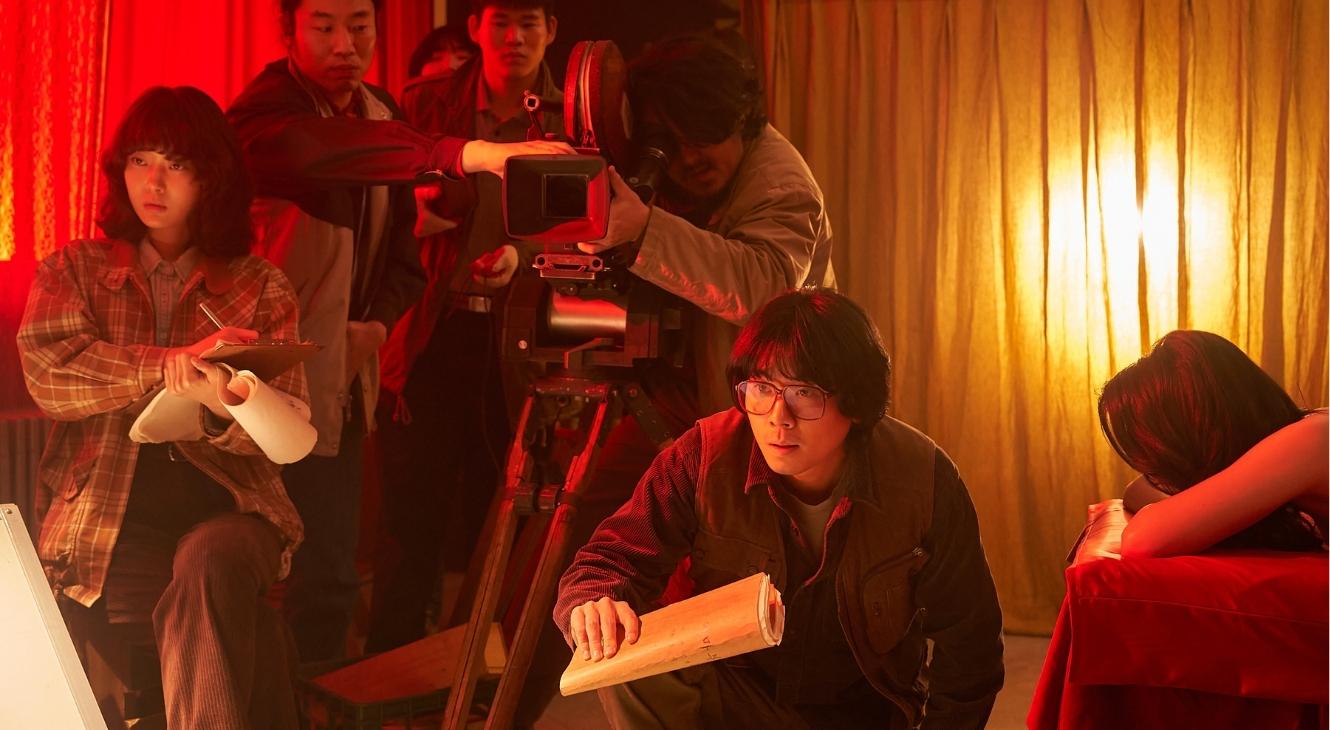
While marketed as a comedy, Aema‘s subject matter does lean heavily into dramatic territory. The comedy featured is arguably more grounded, with the bulk of the male cast members taking on the responsibility of handling the laughs. Because of the nature of the series (as well as the film within the film), much of the humor is focused on sexuality, with crude remarks being the norm. However, the shooting of the erotic film itself features arguably the stronger, more hilarious moments.
It’s no secret that shooting erotic scenes is generally an awkward affair. From the many people who are in the room while the actors simulate the act to the over-the-top noises to the dreaded sock that covers any dangly bits, it’s just not a good time. Director Lee Hae-young knows best how to lean into the naturally comedic elements of shooting these scenes, with close-up shots of Bang Hyo-rin’s face, to the ridiculous dialogue and scenarios the characters are written into. All of it comes together to provide peak cringe comedy gold.
Yet, where Aema stands strongest is in how it handles its darkness. It’s an open secret that the history of filmmaking (and acting as a whole) has been riddled with problems. For women, especially, there has been an uneven power dynamic, with just being present in the industry forcing us on the defense and navigating situations that, frankly, shouldn’t happen. Yet, they do. It’s why, despite its historical setting, Aema is still incredibly relevant today.
Some questionable CGI/green screen moments in its final episode aside, Aema holds nothing back in its examination of the film industry and its complexities. Centered by two incredibly strong, complicated female characters, part of the joy in watching is seeing what they will do next. For Bang Hyo-rin, especially, I can’t think of a better performance tableau than her outing here. Here’s to seeing what she may end up doing next.
Aema is now streaming exclusively on Netflix.
Aema (2025)
-
Rating - 8.5/108.5/10
TL;DR
Centered by two incredibly strong, complicated female characters, Aema holds nothing back in its examination of the film industry and its complexities.

